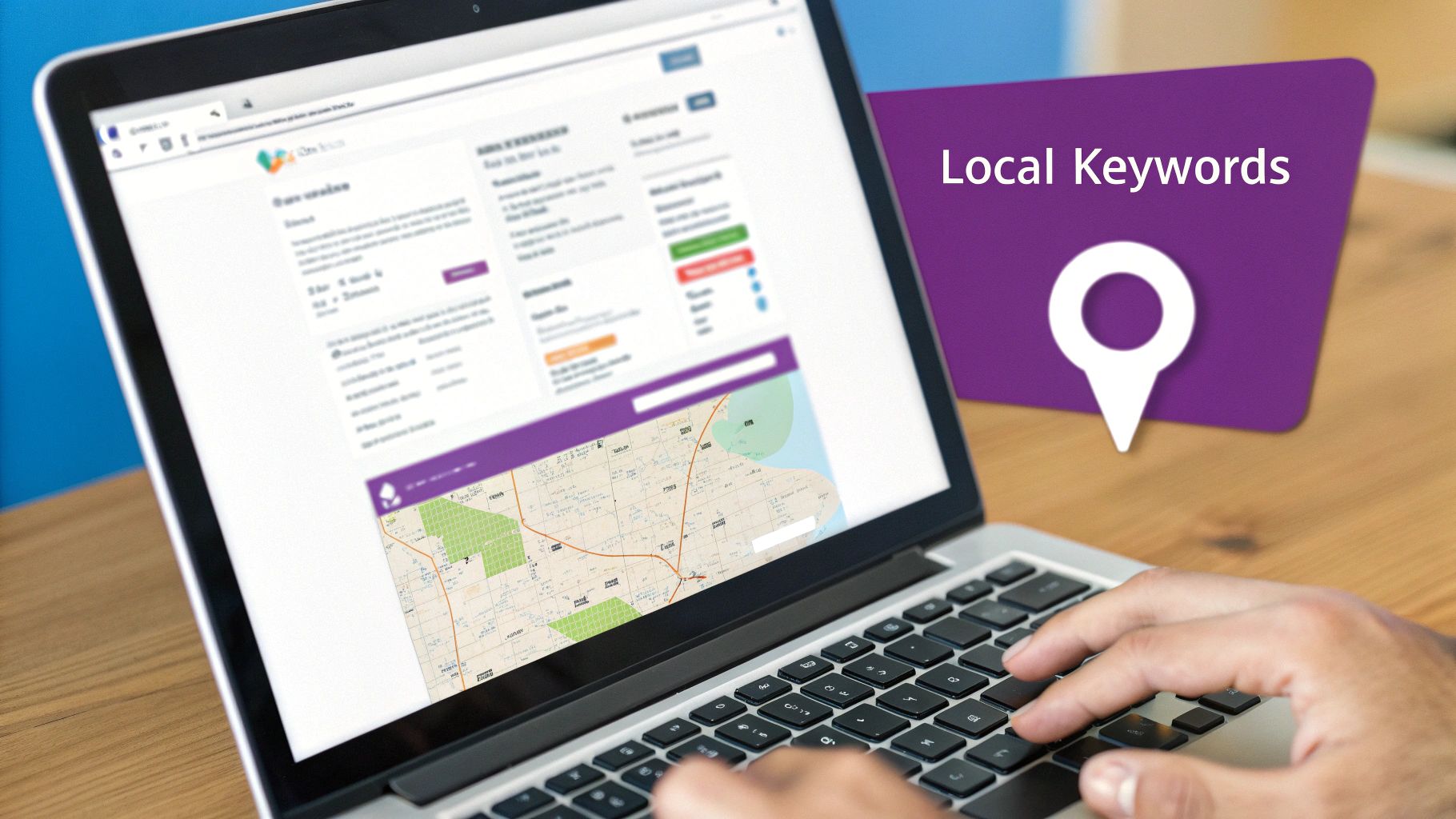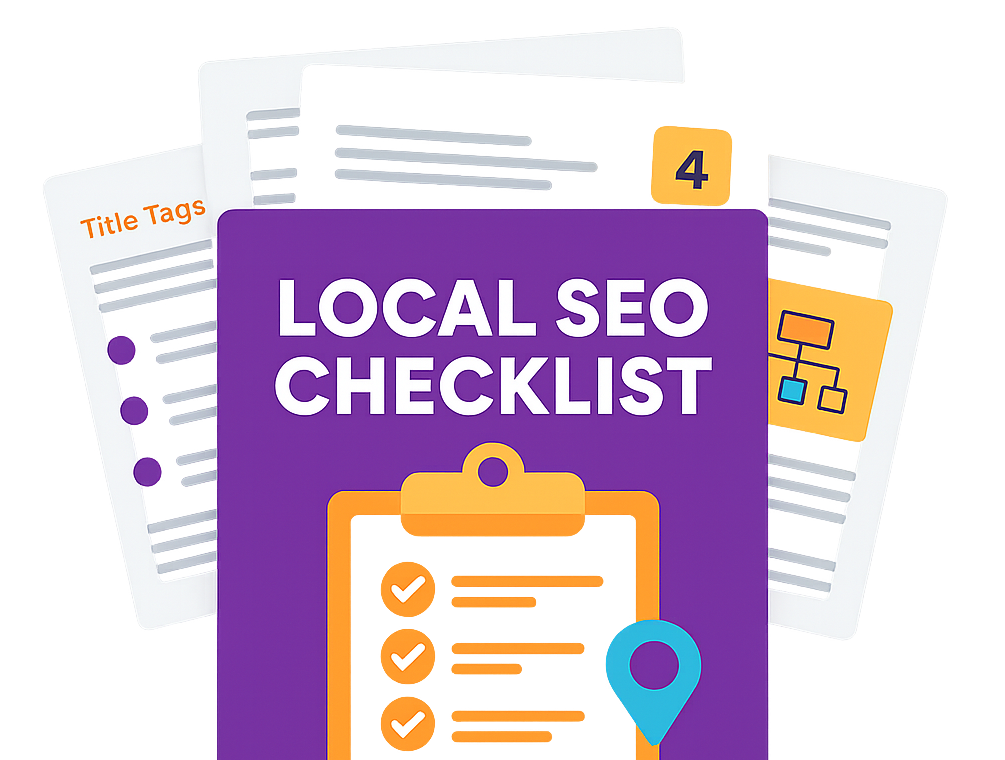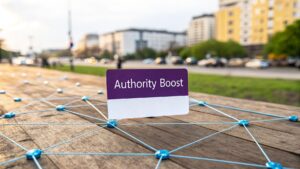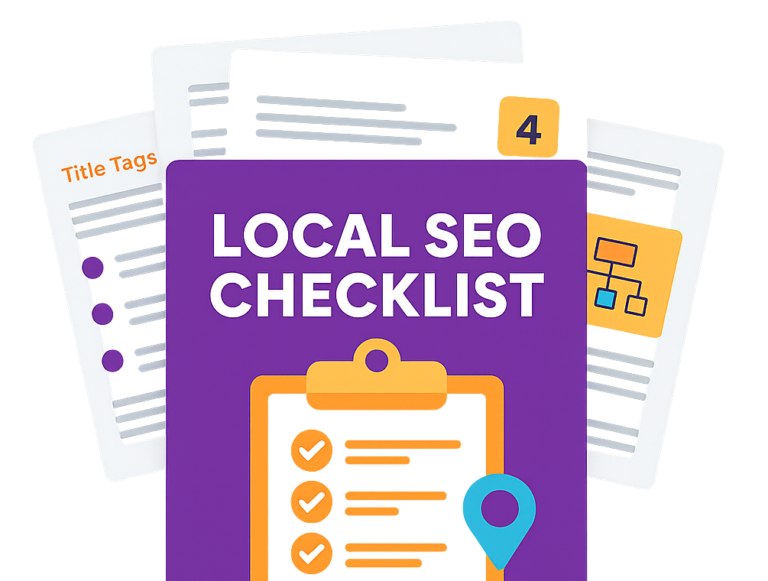In an increasingly competitive market, standing out to customers in your immediate area is more critical than ever. Effective local search engine optimisation (SEO) is no longer a 'nice-to-have' for British businesses; it's the cornerstone of sustainable growth for any company serving a specific geographic area. From a local cafe in Cambridge to a specialist solicitor in Manchester, being visible when a nearby customer searches for your services can be the difference between thriving and merely surviving.
This guide breaks down ten essential local SEO strategies, moving beyond generic advice to provide actionable, UK-focused tactics you can implement today. While it's crucial to understand broader digital marketing strategies for comprehensive online success, this article hones in specifically on capturing local intent.
We will explore how to transform your online presence from a simple listing into a powerful customer acquisition engine. You will learn proven methods for optimising your Google Business Profile, managing online reviews, building a robust local backlink portfolio, and much more. Let’s dive into the techniques that will help you dominate the local search results and connect with the customers right on your doorstep.
1. Google Business Profile Optimisation
Your Google Business Profile (GBP) is the cornerstone of your local SEO strategies, acting as a digital storefront for customers searching on Google Search and Maps. This free tool is often a potential customer's first interaction with your business, making its complete optimisation non-negotiable. By meticulously managing your profile, you ensure that crucial details like your business name, address, and phone number (NAP) are accurate and consistent across the web.
A fully optimised profile goes beyond just the basics. It involves regularly uploading high-quality photos of your services or premises, actively encouraging and responding to customer reviews, and using the Posts feature to share updates, offers, and events. For instance, a local Cambridge café can post its daily specials, while a plumbing service can showcase before-and-after photos of a recent job, providing timely and relevant content that engages searchers directly in the results page.
The following infographic highlights key statistics that underscore the importance of a well-maintained profile.
As the data shows, effective optimisation directly translates into more customer actions and enhanced visibility in crucial local search features. For businesses looking to master this platform, there are many layers to successful Google Business Profile optimisation.
2. Local Keyword Research and Optimisation
Effective local SEO strategies are built on a solid foundation of keyword research that targets customers in your specific service area. This involves identifying and optimising for search terms that signal local intent, such as those including a city, neighbourhood, or phrases like "near me". By strategically weaving these geographically-focused keywords into your website’s content, meta descriptions, and page titles, you directly signal your relevance to search engines for local queries.

A successful approach goes beyond simply adding a town name to a service. It requires understanding the specific language your local audience uses. For example, a roofer in Manchester should target phrases like "roof repairs in Didsbury" or "emergency roofer Stockport" to capture highly qualified traffic. To truly understand the intent behind these searches, consider mastering search query analysis to refine your keyword strategy and connect with customers ready to act.
This targeted optimisation ensures your business appears in front of the right people at the right time. By creating dedicated service pages for each location or neighbourhood you serve, you can tailor your content even more precisely. For instance, a Cambridgeshire-based electrician could have separate pages for "electrician Cambridge," "St Ives PAT testing," and "Huntingdon rewiring services," each fully optimised to rank for those specific terms and attract relevant local enquiries.
3. NAP Consistency Management
NAP (Name, Address, Phone number) consistency is a foundational pillar of local SEO, serving as a critical trust signal for search engines. It involves ensuring your core business details are identical across every online directory, social media profile, and website mention. Inconsistent information, such as listing "St." on one platform and "Street" on another, can confuse search engines like Google, diluting your authority and harming your local search rankings.
Achieving perfect NAP consistency goes beyond a one-time check. It requires a systematic approach to auditing and correcting your online presence. For example, a Cambridge-based law firm must ensure its name, "Smith & Jones Solicitors", appears exactly the same on Yelp, Thomson Local, and its own website, avoiding variations like "Smith and Jones Law". This meticulous attention to detail helps search engines confidently validate your business's existence and location, which is a key factor in ranking for local queries.
To maintain this crucial element of your local seo strategies, it's vital to create a master document with the official NAP format and regularly audit your online citations. You can perform these checks manually or use specialised citation management tools to streamline the process. By prioritising high-authority directories first, you can efficiently build a consistent and trustworthy digital footprint that search engines will reward with better visibility in local search results.
4. Online Review Management Strategy
Your online reviews are a powerful trust signal for both potential customers and search engines, making a proactive management strategy a crucial component of modern local SEO. This involves more than just passively waiting for feedback; it's about systematically encouraging, monitoring, and responding to reviews across platforms like Google, Yelp, and industry-specific sites. A strong portfolio of recent, positive reviews can significantly influence your position in local search results and persuade customers to choose you over competitors.
Implementing an effective strategy means asking for reviews at the peak of customer satisfaction. For instance, a local Cambridge restaurant could add a QR code to its receipts linking directly to their review page, while a service business might send a follow-up email after a successful appointment. Responding to all reviews, both positive and negative, is equally important. A prompt, professional response to a negative review can demonstrate excellent customer service and mitigate potential damage, showing prospective customers that you value feedback and are committed to satisfaction.
The key is to make the process as simple as possible for the customer and to remain consistently engaged. This ongoing effort not only builds social proof but also provides valuable insights into your business operations. By mastering this area, you directly influence purchasing decisions and strengthen your local search authority. For businesses looking to delve deeper, there are many facets to a successful online reputation management strategy.
5. Local Citation Building
Local citation building is the strategic process of creating and managing listings for your business across various online directories, industry-specific sites, and local websites. These citations act as digital references that help search engines like Google verify the accuracy and legitimacy of your business details. Ensuring your Name, Address, and Phone number (NAP) are consistent across these platforms is crucial for building trust and authority in local search results.
A comprehensive citation strategy extends beyond just major directories like Yelp or Yellow Pages. It involves securing listings on platforms highly relevant to your specific sector and location. For example, a Cambridge-based solicitor should prioritise a listing on Avvo and the local Chamber of Commerce directory, while a restaurant would benefit more from a presence on TripAdvisor. Consistently appearing in these relevant, high-authority online spaces reinforces your business's connection to its local area and industry, making it a more prominent choice in search engine rankings.
This consistent and widespread online presence is a fundamental component of effective local SEO strategies, signalling to search engines that your business is a well-established entity within its community. For businesses wanting to master this process, a detailed approach is essential for achieving the best results. You can explore the intricacies of this tactic by reading our ultimate guide to high-authority directory submissions.
6. Location-Based Content Marketing
Location-based content marketing is one of the most powerful local SEO strategies for establishing your business as a community authority. This approach involves creating and sharing content that is specifically relevant and valuable to a local audience, moving beyond just your products or services. By focusing on geographically relevant topics, you can attract nearby customers and significantly improve your local search visibility. This strategy signals to search engines that your business is deeply embedded and active within the community it serves.
A well-executed plan goes beyond simply mentioning your town or city. It means producing content that solves local problems or celebrates community life. For example, a real estate agent in Cambridge could publish a detailed guide to local school catchments, while a restaurant might feature spotlights on the local farms that supply its ingredients. These pieces of content not only attract a local audience but also naturally build opportunities for local backlinks and social shares within the community, strengthening your online presence.
The following video from Ahrefs provides deeper insights into creating effective local content that resonates with your target audience and boosts your search rankings.
7. Schema Markup Implementation for Local Business
Schema markup, or structured data, is a powerful yet technical component of local SEO strategies. It is a specialised vocabulary of code that you add to your website to help search engines like Google understand your content more contextually. By explicitly telling search engines what your data means, you enable them to display your business information as enhanced, informative "rich snippets" directly in the search results, boosting your visibility and click-through rates.
Implementing local business schema allows you to define specific details beyond just your name and address. For instance, a local restaurant in Cambridge could use it to display its star ratings, cuisine type, and price range. Similarly, a medical practice can highlight accepted insurance plans and specialities. This detailed information makes your listing more appealing and useful to potential customers, helping you stand out from competitors who have not organised their data in this way.
The following video provides a foundational understanding of what schema markup is and why it's crucial for SEO.
While it may seem complex, using the JSON-LD format simplifies implementation, and numerous online tools can generate the necessary code. For any local business aiming to maximise its search engine real estate, mastering schema for local SEO is a non-negotiable step toward providing a better search experience and driving more qualified traffic.
8. Local Link Building Strategy
A Local Link Building Strategy is the process of earning backlinks from other geographically relevant websites to yours, a crucial factor in building your site's authority. Unlike general link building, this approach prioritises quality and local relevance over sheer quantity. When a reputable local business, news outlet, or community organisation links to your website, it sends a powerful signal to search engines like Google that your business is a trusted and important part of the local community. This digital "vote of confidence" significantly boosts your local search rankings.
Developing these local connections requires a proactive and relationship-focused approach. For instance, a Cambridge-based accountancy firm could sponsor a local charity run, earning a link from the event's website. Similarly, a local estate agent might contribute an expert quote to a story in the Cambridge Independent, or a new restaurant could partner with a popular local food blogger for a review. These actions create genuine, authoritative backlinks that are far more valuable for local SEO than dozens of generic, non-local links.
The goal is to embed your business within the local digital ecosystem, demonstrating its relevance and authority to both users and search engines. Focusing on building genuine relationships within your community often leads to the most impactful link-building opportunities. For businesses looking to enhance their authority, a well-thought-out plan is essential to learn how to build backlinks effectively.
9. Mobile Optimisation for Local Search
With the vast majority of local searches now happening on smartphones, mobile optimisation is no longer an option but a core component of effective local SEO strategies. This involves ensuring your website provides a seamless and intuitive experience for users on smaller screens. Google's mobile-first indexing means it primarily uses the mobile version of your content for ranking, making a responsive, fast-loading site crucial for visibility.

A well-optimised mobile experience goes beyond just responsive design. It prioritises user intent by making critical information easily accessible. For example, a restaurant in Peterborough must have a mobile menu that is easy to read and a prominent click-to-call button. Similarly, a local retail store should feature a mobile-friendly store locator that integrates with map applications, removing friction for customers on the go. These small adjustments directly impact a user's ability to engage with your business, turning a simple search into a valuable customer action.
To implement this, start by using Google's Mobile-Friendly Test tool to identify any immediate issues. Focus on optimising image sizes to reduce load times, ensure buttons are large enough for easy tapping, and simplify navigation. Every element should be designed to help mobile users find what they need quickly, whether that’s your phone number, address, or an appointment booking form. Prioritising the mobile user journey is essential for capturing and converting local search traffic in today's market.
10. Voice Search Optimisation for Local Queries
With the rise of smart speakers and voice assistants, optimising for voice search has become a crucial component of modern local SEO strategies. Voice queries are often conversational and carry strong local intent, as users ask for directions, business hours, or recommendations "near me". Failing to adapt to this behaviour means missing out on a growing volume of highly qualified, ready-to-convert traffic.
Effective voice search optimisation involves structuring your content to provide direct answers to common questions. This means targeting long-tail, conversational keywords and creating dedicated FAQ pages that address user queries like, "find a plumber in Cambridge open on Sundays" or "what time does [your business name] close?". The goal is to make your information the most accessible and relevant answer for voice assistants to find and relay to the user, often by securing a coveted featured snippet position in search results.
This approach requires a focus on natural language and a deep understanding of customer intent. By thinking about the specific questions your audience might ask aloud and creating clear, concise content that answers them, you align your digital presence with the hands-free, on-the-go nature of voice search. For businesses looking to capture this audience, successful voice search optimisation is key to future-proofing their local visibility.
Local SEO Strategies Comparison Matrix
| Strategy | Implementation Complexity | Resource Requirements | Expected Outcomes | Ideal Use Cases | Key Advantages |
|---|---|---|---|---|---|
| Google Business Profile Optimisation | Low to Moderate | Minimal, mostly time for maintenance | Up to 35% increase in website clicks, local visibility | Local businesses wanting direct Google presence | Free tool, direct local search impact, customer engagement |
| Local Keyword Research and Optimisation | Moderate | Research tools, ongoing analysis | Higher conversion, better local rankings | Businesses targeting specific locations | Higher intent traffic, less competition than broad terms |
| NAP Consistency Management | Moderate to High | Audit tools, ongoing monitoring | Improved rankings, trust, reduced customer confusion | Businesses with multiple listings | Builds search engine trust, supports voice search |
| Online Review Management Strategy | Moderate to High | Time-intensive monitoring and responses | Increased trust, higher CTR, feedback for improvement | Customer-facing businesses valuing reputation | Direct ranking impact, builds credibility |
| Local Citation Building | Moderate to High | Time and directory submissions | Improved local authority, referral traffic | Businesses needing wide online presence | Enhances local visibility, supports NAP consistency |
| Location-Based Content Marketing | High | Content creation resources | Local authority, targeted local traffic | Brands focusing on local engagement | Builds local expertise, shareable content |
| Schema Markup Implementation for Local Business | High | Technical SEO skills | Better SERP appearance, potential rich snippets | Businesses wanting improved search display | Enhanced SERP features, supports voice search |
| Local Link Building Strategy | High | Networking, outreach efforts | Improved authority and local rankings | Businesses growing local SEO via backlinks | Builds community relationships, improves domain authority |
| Mobile Optimisation for Local Search | Moderate to High | Technical expertise, continuous updates | Captures mobile traffic, lowers bounce rates | Businesses with high mobile local searches | Better UX, supports Google mobile-first indexing |
| Voice Search Optimisation for Local Queries | High | Content restructuring, technical SEO | Capture voice traffic, featured snippet rankings | Businesses targeting smart speakers/voice users | Targets emerging search behaviour, high local intent |
Bringing It All Together: Your Path to Local Dominance
Navigating the landscape of local SEO can feel like assembling a complex puzzle. Each strategy we have explored, from optimising your Google Business Profile to fine-tuning for voice search, represents a critical piece. Viewed in isolation, a single tactic might offer a minor boost, but the true power lies in their synergy. A consistent and integrated approach is what transforms individual efforts into a dominant local presence.
The journey to the top of local search results is not a sprint; it is a marathon of consistent application and refinement. Think of these local seo strategies as interconnected pillars supporting your business's visibility. Your meticulously managed NAP details reinforce the trust built by glowing customer reviews. Your localised content answers the specific questions uncovered during keyword research, while technical optimisations like schema markup and mobile-friendliness ensure search engines can easily understand and serve that content to the right audience. This interwoven effort sends unmistakable signals to Google that your business is the most relevant, authoritative, and trustworthy choice for local customers.
Key Takeaways for Immediate Action
To distil these comprehensive strategies into a clear action plan, focus on these foundational pillars first:
- Audit and Perfect Your Foundation: Start with your Google Business Profile and NAP consistency. These are the non-negotiable bedrock of your local SEO. Ensure every detail is accurate, complete, and uniform across all platforms.
- Engage and Build Social Proof: Actively pursue and manage online reviews. A steady stream of positive feedback is one of the most powerful trust signals for both potential customers and search engines.
- Create Value with Local Content: Move beyond generic service pages. Develop content that speaks directly to your local community in Cambridgeshire, answering their unique questions, highlighting local involvement, and positioning your business as an integral part of the area.
- Measure, Adapt, and Improve: Consistently track your performance using tools like Google Analytics and Search Console. Monitor your local rankings, analyse which strategies are driving traffic, and be prepared to adapt your approach based on real data.
Mastering these local seo strategies is not just about climbing search rankings; it is about forging a stronger connection with your local community and driving tangible growth. It’s about ensuring that when a potential customer nearby needs your services, your business is not just an option, it's the obvious choice. By committing to this holistic approach, you build a sustainable competitive advantage that will attract more qualified leads, increase footfall, and ultimately, bolster your bottom line for years to come.
Feeling overwhelmed by the scope of these local seo strategies? Let the experts at Bare Digital, a specialist Cambridgeshire SEO agency, create a tailored plan for you. We offer a free SEO Health Check to pinpoint your greatest opportunities and provide a clear, cost-effective path to achieving market-leading results. Contact Bare Digital today to start your journey to local dominance.








